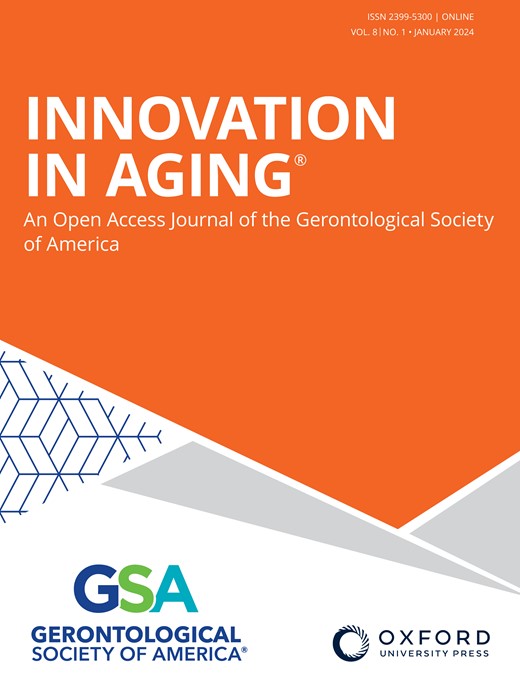培养学生适应多代劳动力:老年工人和退休人员的观点
IF 4.9
3区 医学
Q1 GERIATRICS & GERONTOLOGY
引用次数: 0
摘要
摘要 劳动力多样性可以成为个人、人际关系和经济发展的重要资产。目前,劳动力中有五代人,年龄多样性十分普遍。然而,代际间的紧张关系很常见,这主要是由以年龄和代际为中心的刻板印象造成的,这些刻板印象可能会渗透到工作场所的所有流程中。我们从 "老年友好型大学 "框架出发,旨在收集定性数据,为大学生培训项目的开发提供信息,将与年龄相关的偏见信息与有意义的代际交流机会相结合,以模拟职场互动。我们在社区举办了三个焦点小组,与年龄在 60-69 岁之间、目前在职或最近退休的成年人(N = 10)讨论他们在工作场所的代际互动。参与者的平均工作年限为 41.06 年,从事多个行业,最常见的是行政工作、食品服务、政府和医疗保健。报告中最常见的主题是年轻同事对参与者工作经验的否定,有些人认为这是由于他们的年龄而缺乏尊重,有些人则认为这是沟通的障碍。与会者强调,技术加剧了代际之间的紧张关系。与会者还报告说,年轻同事经常向他们寻求一般生活建议,这有助于缓解紧张关系。他们愿意看到老年人的智慧在一般情况下的价值,而不是在具体工作中的价值,这对未来职业准备培训计划的内容和结构有一定的影响。我们还将讨论在工作场所加强积极的代际交流和缓解代际紧张关系的建议。本文章由计算机程序翻译,如有差异,请以英文原文为准。
PREPARING STUDENTS FOR A MULTIGENERATIONAL WORKFORCE: PERSPECTIVES FROM OLDER WORKERS AND RETIREES
Abstract Workforce diversity can be a major asset for personal, interpersonal, and economic development. Age diversity is prevalent with five generations currently represented in the workforce. Intergenerational tension is common, however, largely fueled by stereotypes centered on age and generation that can infiltrate all workplace processes. Working from the Age-Friendly University framework, our aim was to gather qualitative data to inform the development of a training program for college students, pairing information on age-related bias with opportunities for meaningful intergenerational exchange to mimic workplace interactions. We hosted three community-based focus groups with adults ranging from 60-69 years of age who were either currently employed or recently retired (N = 10) to discuss their intergenerational interactions in the workplace. Participants had an average of 41.06 years of work experience and worked across multiple industries, most commonly administrative work, food services, government, and healthcare. The most common theme reported was the dismissal of participants’ work experience by their younger colleagues, which some equated to a lack of respect due to their age, and others painted as a breakdown in communication. Technology was highlighted as exasperating intergenerational tensions. Participants also reported that younger colleagues often approached them for general life advice, which helped to reduce tensions. The willingness to see the value of older adults’ wisdom in general, but not specific to the work at hand, has implications for the content and structure of future career-readiness training programs. Recommendations for enhancing positive intergenerational exchanges and reducing generational tensions within the workplace will be discussed.
求助全文
通过发布文献求助,成功后即可免费获取论文全文。
去求助
来源期刊

Innovation in Aging
GERIATRICS & GERONTOLOGY-
CiteScore
4.10
自引率
0.00%
发文量
72
审稿时长
15 weeks
期刊介绍:
Innovation in Aging, an interdisciplinary Open Access journal of the Gerontological Society of America (GSA), is dedicated to publishing innovative, conceptually robust, and methodologically rigorous research focused on aging and the life course. The journal aims to present studies with the potential to significantly enhance the health, functionality, and overall well-being of older adults by translating scientific insights into practical applications. Research published in the journal spans a variety of settings, including community, clinical, and laboratory contexts, with a clear emphasis on issues that are directly pertinent to aging and the dynamics of life over time. The content of the journal mirrors the diverse research interests of GSA members and encompasses a range of study types. These include the validation of new conceptual or theoretical models, assessments of factors impacting the health and well-being of older adults, evaluations of interventions and policies, the implementation of groundbreaking research methodologies, interdisciplinary research that adapts concepts and methods from other fields to aging studies, and the use of modeling and simulations to understand factors and processes influencing aging outcomes. The journal welcomes contributions from scholars across various disciplines, such as technology, engineering, architecture, economics, business, law, political science, public policy, education, public health, social and psychological sciences, biomedical and health sciences, and the humanities and arts, reflecting a holistic approach to advancing knowledge in gerontology.
 求助内容:
求助内容: 应助结果提醒方式:
应助结果提醒方式:


